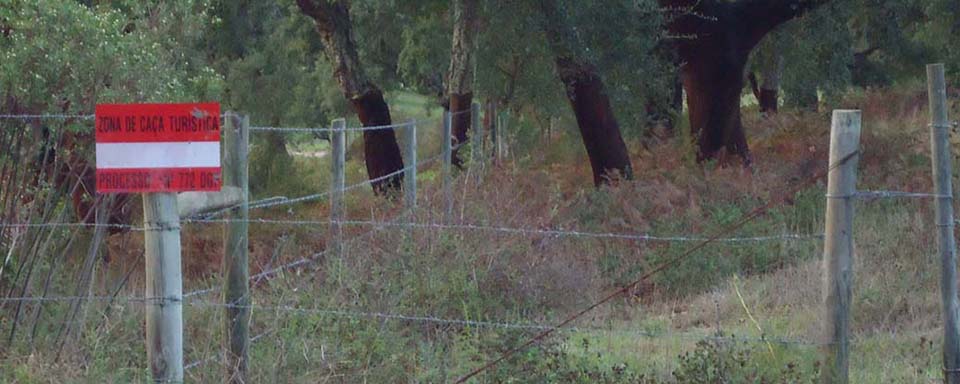
... Portugal has 5 bars 3G everywhere ... www.freedict.com: caça = hunt ...
Crtd 12-11-01 Lastedit 15-12-26
It is a misunderstanding to think a nomad does not need ground. Well you do not need to buy it, that's true, but you need it, even more then the sedentary classes you despise, who think they "have" land, while in fact they only have guns and laws to keep others off it, with a false sense of justice that they like to believe in. Nomads tend not to recognize land as somebody's property, after all, that game started at the dawn of sedentary history by some people settling somewhere and chasing others, saying "this is ours". But just "not recognizing" does not give you a place to sleep ...

... Portugal has 5 bars 3G
everywhere ... www.freedict.com:
caça = hunt ...
My first attempt was to find some small fresh water lakes I saw on Google Earth East of Lisbon and the Tagus. But its resolution does not allow for seeing barbed wire. All roads in that beautiful area have it, left and right. It feels like when you drove on the narrow corridor from former West Germany to Berlin: left and right suspicious soldiers of a bordering country. Military area. 100 km2 or so. But after having crossed that, the barbed wire did not stop and roads kept being narrow corridors for cars. Caça (hunt). Caça turistica, caça municipal, caça associativa, Portugal seemed to have as many types of hunt as it has country roads. I got saved for the night when I found, in the estuary of the Sado a public corridor road to a isolated farmer's village, with sand roads leading into their lands, on which I found a nice place with sympathetic company:
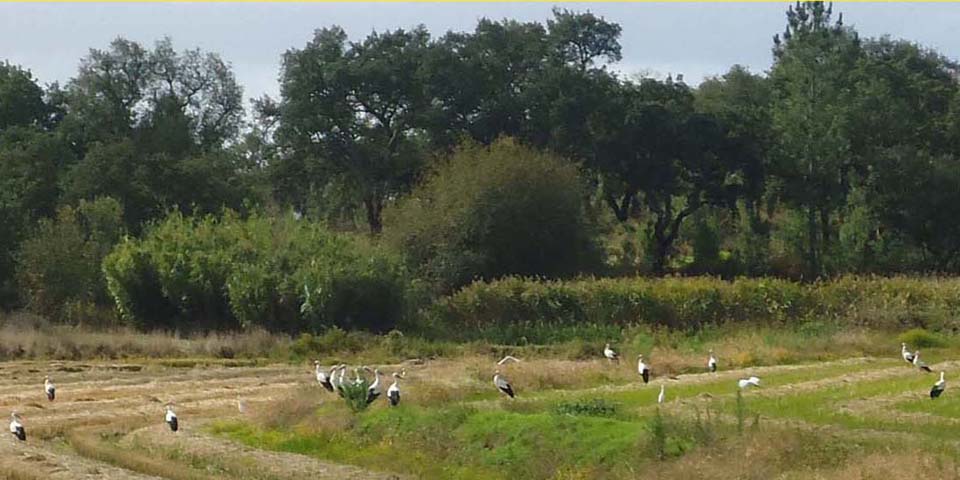
... some other nomads: thousands of storks on their way to
Africa (Google Earth: cegonho.kmz)...
some other nomads: thousands of storks on their way to Africa.
No use to hunt: they lost all their weight preparing for the trip.
So
finally I felt I was where I belonged and baptized the parking: Cegonho (stork,
G-Earth users click cegonho.kmz).
But a lot of flies annoyed me who were relieved from their task at dusk by
zillions of mosquitos. Their bites were not very itchy but left bright red tiny
spots all over me that made me hunt for mosquito net the next day to tape on
whatever windows were needed to ventilate day or night. I now realized that I
would see a large part of Portugal through net wire from behind barbed wire.
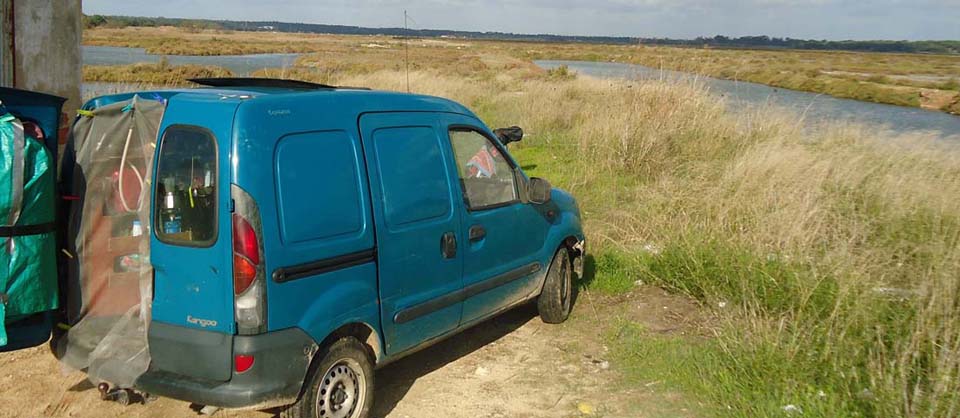
... rear door, side and
top window openings netted ... sitting inside enjoying nature undisturbed
... sympathetic oyster fishers told me I was welcome here at their harbour
(Google Earth: Pescadores Amicales.kmz) ...
At the sea side, heading to Lisbon, the barbed wire retreated a bit, there were nice quiet places for parking to sleep, but fresh water lakes kept largely absent or out of reach. Anyway, where I found one it was much colder than I had imagined for this climate and a heroic deed to swim in.
In the absence of my "frozen" car GPS, I discovered new (for me) amazing features of the smart phone I already have for quite some time.
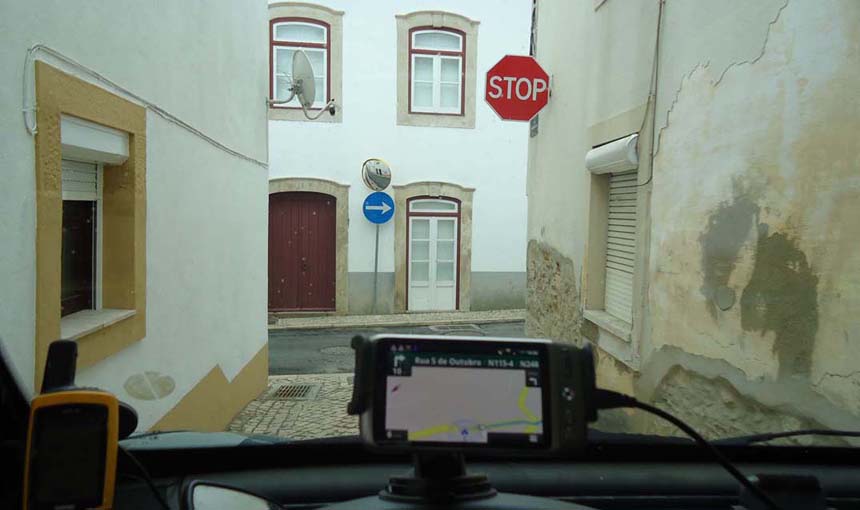
... Google navigation leads my smart phone in a temporary deviation in a small
village of Portugal ...
With the smart phone's built-in GPS receiver Google navigation acts as a true road navigation ("at the roundabout, take the third exit") by retrieving the map-data from the internet. Which means you are given the little chunk of Google maps that you need, in road navigation view. But Google maps is continuously updated on the Google servers, so: if road authorities have a good procedure to upload their small changes, even temporary deviations to the database used by Google Maps, then when Jão starts digging the road your smart phone already knows how to lead you around. Not in Villa Vinho but all over the bloody globe. This is unbelievable. No use in Africa since your internet signal goes down ever other curve. But in a country like Portugal with 5 bars cheap 3G up into Cegonho this leads you everywhere. I could not stop myself buying an indecently expensive adjustable car dashboard console for my smart phone immediately.
Lisbon! I arrived at dusk from South over the spectacular toll bridge Ponte de 25 de Abril. My smart phone led me through a jungle of split level roads and one way streets through a very hilly city straight to the Largo Portas do Sol (do not expect short street names in Portugal, in fact this counts as a short one), which is nicely between the three jazz clubs in the old town that I found on Google. Club #1 had meanwhile succumbed to fado, but with very good restaurant. After some ray and white wine I went to Onda Jazz where a jam session was announced at 10, which in the estimation of the expert public, smoking outside in the narrow stair cased cul-de-sac Arco de Jesus (Google Earth: Arco de Jezus.kmz) would mean 11:30. I kept my soprano sax firmly under the table, for at the start they were too good, and once they got drunk enough to join they stopped. But for the next visit I know the timing.
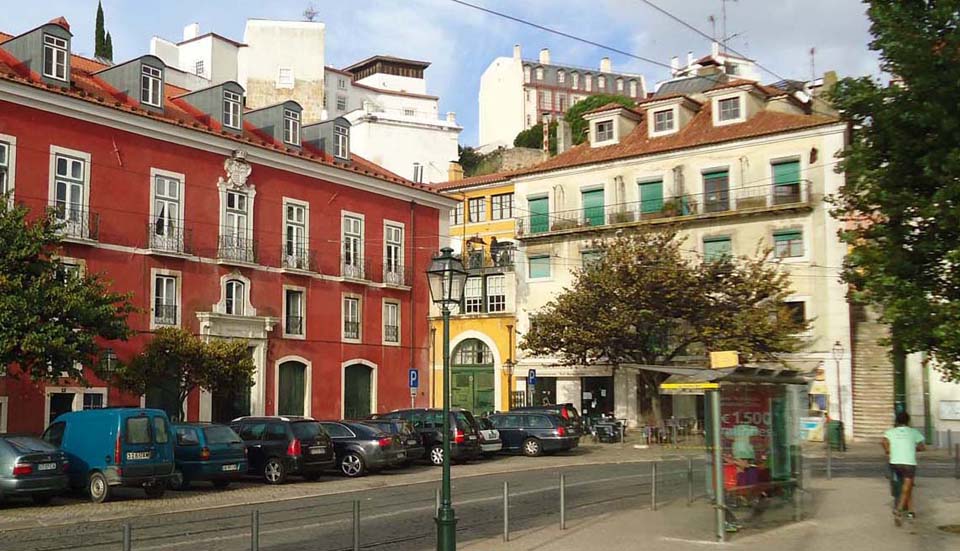
... a vagabond breakfast at
Largo Portas do Sol (Google Earth:
Largo Portas do Sol.kmz) ...
Parking in Lisbon is an art. Do not pay attention to signs. Ask
people. They will not tell you the rules but come up with a theory: "Well you
are not doing too badly there ... though your left rear tire is on a parking
reserved for disabled transsexuals, you could argue to be forced so by the car
in front which has not been properly positioned within its parking square. In
sum, I strongly presume you could claim you are OK until tomorrow 9, but you
will probably run no risk until 11:30". To be sure meeting the cops awake, I put
my alarm clock at 9, but that was the last time I did that.
The next day,
a 10 minutes drive away, I found something completely different!
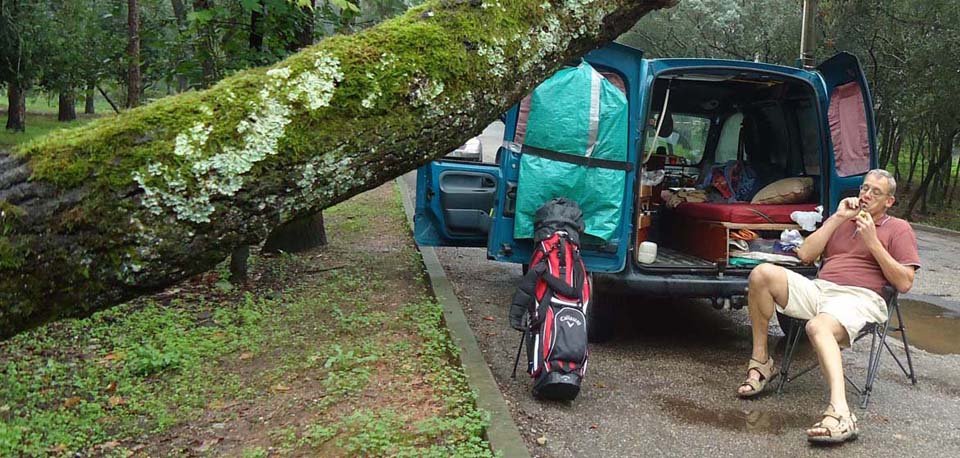
... something
completely different (Google Earth: Parque
Florestal.kmz)...
Parque Florestal De Monsanto. Rightly named a forest. With many quiet places to park for the night and listen to the birds. 10 min from town. All a nomad needs.
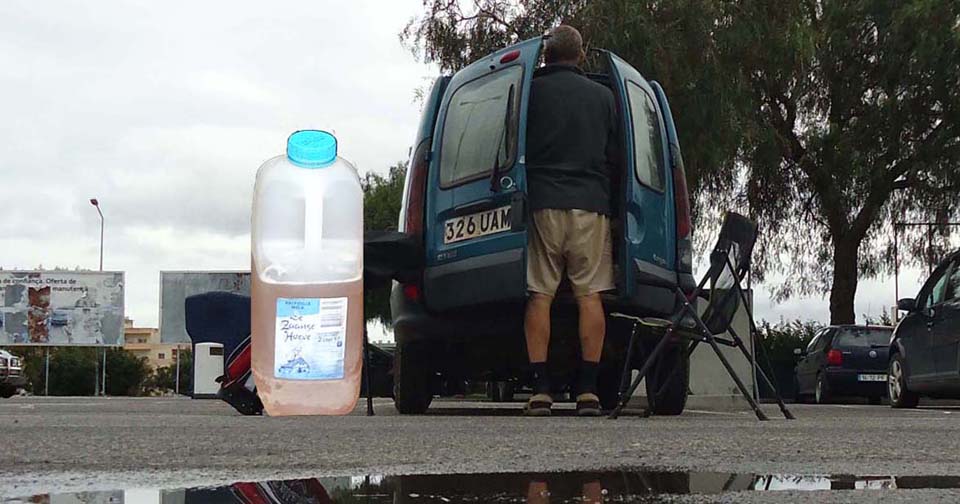
... the town nomad
does well to establish his private urinary ...
The hunt for access to fresh water continued. Rivers, even those given the full status of rio, are usually not more that tiny currents of muddy water running around stones. You can't even wash your clothes in them. But no so the Tagus! There I finally found the place, submerged myself in the polar cold using the extremes of my willpower, swam and survived. This was mainly to prop me up for a major event: my work of the last days had made me consider EthicaWeb, a reference web for students of the Ethica of Spinoza, ready for launching. The next step would be to mail a list of leading Spinoza experts in different countries and inquire into the possibilities of presenting it before academic audiences. After my dive I solemnly pressed the send-button. (to no avail whatsoever, as it turned out later, but nevertheless the story of this web would continue)
The river went down a meter overnight, and the next day came back. Irregular heavy rains upstream I must presume. It could be tide, the place is 30 km from the Tagus mouth at Lissabon Bay, but a upciming tide river rise would slow down current, and here it got faster. At the high moments its speed was 4 km/h, very high, almost walking speed, bringing water hyacinth with aigrettes, like the river Nile. Thousands of cormorants land in front of you with great noise, and start diving and fighting over the booty. Some fishermen, some yachts, no barges whatsoever.
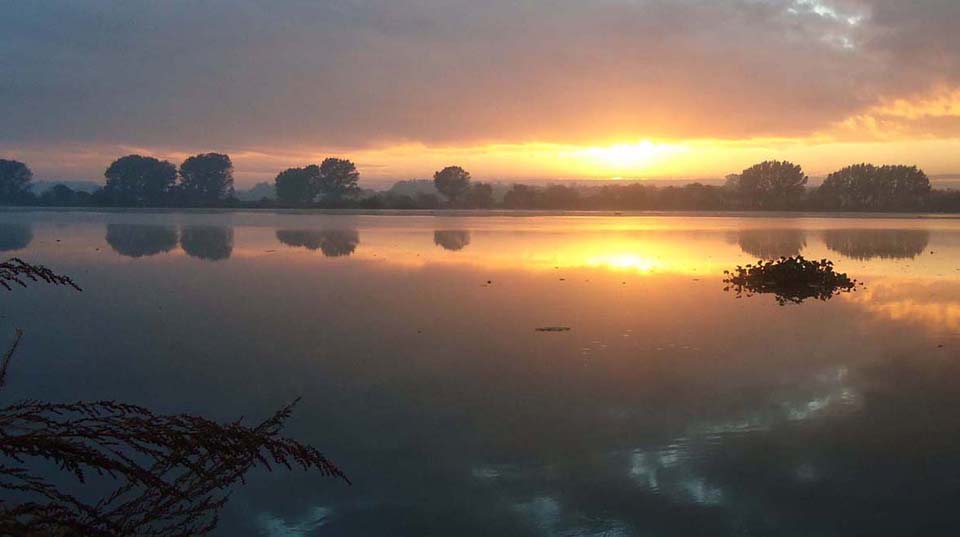
... sunrise at the
Tagus (Google Earth: Campo Tejo.kmz) ...